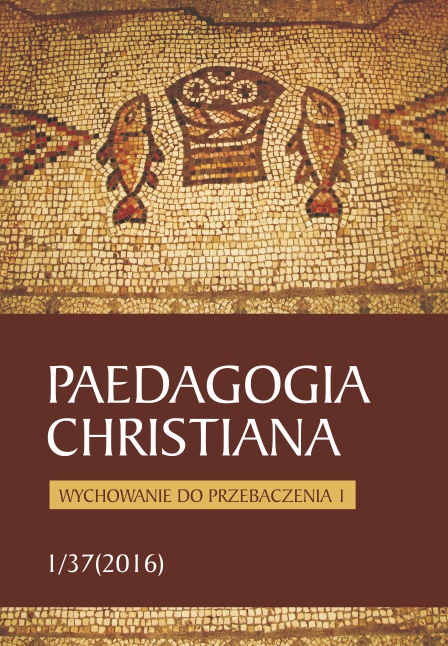Educational Questions of Forgiveness
DOI:
https://doi.org/10.12775/PCh.2016.001Keywords
harm, forgiveness, moral aspect of forgiveness, conditions of forgiveness, religion and forgivenessAbstract
Harm and answer to it in a form of forgiveness or refusal of forgiveness constitute important elements of human life, thus, of human development; therefore, they should become the subjects of educational reflection. However, the issues of relations between forgiveness and human development cannot be decided on with unequivocal statements. Despite the positive perception of forgiveness, one could easily see that forgiveness for which the victim is not mature enough yet may destroy him, and forgiving the wrongdoer, who does not understand his acts, may confirm his belief of rightness of his wrong deeds. In this context, when discussing the role of forgiveness in education, and, consequently, education of forgiveness, one should ask the question of the essence of forgiveness, of its moral value and, especially, relation to justice, of its conditions and course and; finally, its religious dimension. This article is of introductory nature – it aims at introducing problems and asking question, and not at solving and answering them. Implementation of the issue of forgiveness to the educational processes without prior reflection on the mentioned subjects would be not only naive but also, in relation to some pupils and especially those burdened with difficult experiences, may lead to further dilemmas and life crises.
References
Al-Mabuk, Radhi, Robert D. Enright, Paul A. Cardis. „Forgiveness Education with Parentally Love-Deprived Late Adolescents”. Journal of Moral Education 24 (1995): 427–444.
Arendt, Hannah. Kondycja ludzka, tłum. Anna Łagodzka. Warszawa: Wydawnictwo Aletheia, 2010.
Augsburger, David. Sztuka przebaczania, tłum. Andrzej Czarnocki. Warszawa: Świat Książki, 1996.
Augustyn, Józef. Ból krzywdy, radość przebaczenia. Kraków: Wydawnictwo M, 1998.
Bassett, Rodney L., Kelly M. Bassett, Matthew W. Lloyd, Jason L. Johnson. „Seeking Forgiveness: Considering The Role Of Moral Emotions”. Journal of Psychology and Theology 34, 2 (2006): 111–124.
Bell, Macalester. „Forgiving Someone for Who They Are (and Not Just What They’ve Done)”. Philosophy and Phenomenological Research 3 (2008): 625–658.
Bishop, Donald H. „Forgiveness in Religious Thought”. Studies in Comparative religion 2, 1 (1968): 21–30.
Enright, Robert D., Elizabeth A. Gassin, Jeanette A. Knutson. „Waging Peace Through Forgiveness Education in Belfast, Northern Ireland: A Review and Proposal for Mental Health Improvement of Children”. Journal of Research in Education 13, 1 (2003): 51–61.
Enright, Robert D., Jeanette A. Knutson Enright, Anthony C. Holter, Thomas Baskin, Casey Knutson. „Waging Peace through Forgiveness in Belfast, Northern Ireland II: Educational Programs for Mental Health Improvement of Children”. Journal of Research in Education 17, 1 (2007): 63–78.
Giulianini, Annalisa. O przebaczeniu, czyli jak uleczyć duszę, tłum. Magdalena Osocha. Kraków: Wydawnictwo Franciszkanów „Bratni Zew”, 2008.
Grün, Anselm. Przebacz samemu sobie. Pojednanie – przebaczenie, tłum. Juliusz Zychowicz. Kraków: Wydawnictwo WAM, 2001.
Harris, Alex H. S., Frederic Luskin, Sonya B. Norman, Sam Standard, Jennifer Bruning, Stephanie Evans, and Carl E. Thoresen. „Effects of a Group Forgiveness Intervention on Forgiveness, Perceived Stress, and Trait-Anger”. Journal of Clinical Psychology 6 (2006): 715–733.
Hewstone, Miles, Ed Cairns, Alberto Voci, Juergen Hamberger, Ulrike Niens. „Intergroup Contact, Forgiveness, and Experience of «The Troubles» in Northern Ireland”. Journal of Social Issues 62, 1 (2006): 99–120.
Hryniewicz, Wacław. Wiara rodzi się w dialogu. Kraków: Wydawnictwo WAM, 2015.
Hughes, Paul M. „Forgiveness”. W: The Stanford Encyclopedia of Philosophy, red. Edward N. Zalta (Spring 2015 Edition). http://plato.stanford.edu/archives/spr2015/entries/forgiveness/ (dostęp: 19.05.2016)
Król, Aldona. „Wychowanie do przebaczenia”. W: Wychowanie chrześcijańskie. Między tradycją a współczesnością, red. Alina Rynio, 432–442. Lublin: Wydawnictwo KUL, 2007.
Larsen, Ernie. Od gniewu do przebaczenia. Jak przezwyciężyć toksyczne emocje, by żyć w zgodzie ze sobą, tłum. Ewa Zaremba. Gdańsk: GWP, 2000.
McCullough, Michael E., Everett L. Worthington jr, Kenneth C. Rachal. „Interpersonal Forgiving in Close Relationships”. Journal of Personality and Social Psychology 73, 2 (1997): 321–336.
McCullough, Michael E., K. Chris Rachal, Steven J. Sandage, Everett L. Worthington, Jr., Susan Wade Brown, Terry L. Hight. „Interpersonal Forgiving in Close Relationships: II. Theoretical Elaboration and Measurement”. Journal of Personality and Social Psychology 75, 5 (1998): 1986–1603.
Mróz, Mirosław. Tajemnica ludzkiej nieprawości. Aktualność nauki św. Tomasz z Akwinu o złu moralnym i wadach głównych. Toruń: Wydawnictwo Naukowe UMK, 2010.
Murphy, Jeffrie G. „Forgiveness and Mercy”. W: Routledge Encyclopedia of Philosophy, t. 3, red. Edward Craig, 697–701. London–New York, Routledge, 1998.
Murphy, Jeffrie G. „Forgiveness and Resentment”, Midwest Studies in Philosophy 7, 1 (1982): 503–516. DOI: 10.1111/j.1475-4975.1982.tb00106.x.
Newberry, Paul A. „Joseph Butler on Forgiveness: A Presupposed Theory of Emotion”. Journal of the History of Ideas 62, 2 (2001): 233–244. DOI: dx.doi.org/10.1353/jhi.2001.0016.
Richards, Norvin. „Forgiveness”. Ethics 99, 1 (1988): 77–97.
Rye, Mark S., Kenneth I. Pargament, M. Amir Ali, Guy L. Beck, Elliot N. Dorff, Charles Hallisey, Vasudha Narayanan, James G. Williams. „Religious Perspectives on Forgiveness”. W: Forgiveness. Theory, Research, and Practice, red. Michael E. McCullough, Kenneth I. Pargament, Carl E. Thoresen, 17–40. New York–London: The Guilford Press, 2000.
Rye, Mark S., Kenneth I. Pargament. „Forgiveness and Romantic Relationship in College. Can It Heal the Wounded Heart?”. Journal of Clinical Psychology 4 (2002): 419–441.
Scheler, Max. Resentyment a moralność, tłum. Jan Garewicz. Warszawa: Czytelnik, 1997.
Staub, Ervin, Laurie Anne Pearlman, Alexandra Gubin, Athanase Hagengimana. „Healing, Reconciliation, Forgiving and the Prevention of Violence after Genocide or Mass Killing: An Intervention and Its Experimental Evaluation in Rwanda”. Journal Of Social And Clinical Psychology 3 (2005): 297–334.
Szymala, Katarzyna. „Przebaczenie jako działanie. O znaczeniu tego, co nieprzewidywalne dla edukacji”. Parezja 1 (2015): 103–116. DOI: 10.15290/parezja.2015.03.09.
West, William. „Issues Relating to the Use of Forgiveness in Counselling and Psychotherapy”. British Journal of Guidance & Counselling 4 (2001): 415–423.
Wigura, Karolina. Wina narodów. Przebaczenie jako strategia prowadzenia polityki. Gdańsk–Warszawa: Wydawnictwo Naukowe Scholar, 2011.
Wrońska, Katarzyna. „Przebaczenie jako problem wychowania”. W: Pedagogika kultury – wychowanie do wyboru wartości, red. Bogusław Żurakowski, 57–78. Kraków: Oficyna wydawnicza „Impuls”, 2003.
Zięba, Krzysztof. „Holocaust i przebaczenie”. W: Ku pamięci, przestrodze i wybaczeniu, red. Danuta Kocurek, Maria Ruman, 29–52. Kraków: Wydawnictwo «scriptum», 2013.
Downloads
Published
How to Cite
Issue
Section
Stats
Number of views and downloads: 700
Number of citations: 0



